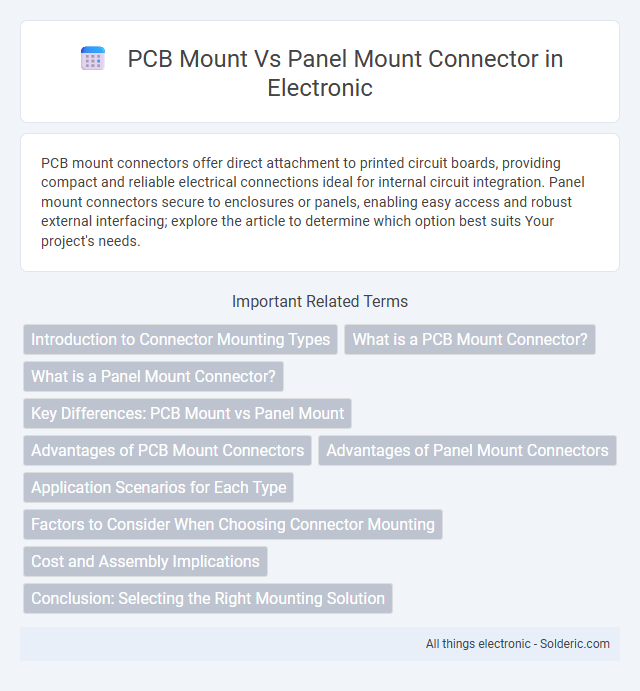PCB mount connectors offer direct attachment to printed circuit boards, providing compact and reliable electrical connections ideal for internal circuit integration. Panel mount connectors secure to enclosures or panels, enabling easy access and robust external interfacing; explore the article to determine which option best suits Your project's needs.
Comparison Table
| Feature | PCB Mount Connector | Panel Mount Connector |
|---|---|---|
| Mounting Location | Directly on printed circuit board (PCB) | Fixed on an enclosure or panel surface |
| Installation | Soldered onto PCB pads or through-holes | Secured with nuts or screws on panel cutouts |
| Application | Internal device connections and signal routing | External interface for user or device access |
| Durability | Moderate mechanical support, sensitive to board stress | High mechanical stability and protection |
| Maintenance | Difficult to replace without PCB desoldering | Easier replacement or upgrade without PCB handling |
| Size Constraints | Depends on PCB layout and space | Depends on panel cutout specifications |
| Common Use Cases | Embedded systems, compact electronics | Control panels, equipment front-ends |
Introduction to Connector Mounting Types
PCB mount connectors are designed to be soldered directly onto the printed circuit board, ensuring a stable electrical connection and minimizing space usage within electronic devices. Panel mount connectors are installed through a cutout in a device's enclosure, providing accessible external connection points ideal for user interaction or equipment interfacing. Choosing between PCB mount and panel mount connectors depends on your device's design requirements, space constraints, and intended use.
What is a PCB Mount Connector?
A PCB mount connector is an electrical component designed to be soldered directly onto a printed circuit board (PCB), providing reliable and compact connectivity for electronic devices. These connectors ensure secure electrical connections by aligning and fastening onto designated PCB pads or through-holes, facilitating easy integration in complex electronic assemblies. Common types include surface-mount and through-hole connectors, optimized for efficient signal transmission and mechanical stability on various electronic circuit boards.
What is a Panel Mount Connector?
A panel mount connector is a type of electrical connector designed to be affixed securely to a panel surface, providing a stable interface for external connections. It typically features mounting hardware such as screws or flanges to ensure a robust attachment, allowing easy access for cable terminations on devices or enclosures. These connectors are commonly used in industrial, automotive, and communication equipment to facilitate reliable and durable connections where the connector is fixed on the equipment panel.
Key Differences: PCB Mount vs Panel Mount
PCB mount connectors are designed for direct attachment to printed circuit boards, providing secure electrical connections within electronic devices. Panel mount connectors are installed on the exterior panels or chassis, allowing external cables or connectors to interface with internal circuitry. Key differences include their mounting location, hardware requirements, and accessibility for maintenance or cable management.
Advantages of PCB Mount Connectors
PCB mount connectors offer a compact and efficient design that integrates directly onto printed circuit boards, reducing assembly time and minimizing wiring complexity. Their precise alignment ensures reliable electrical connections and improved signal integrity, which is crucial for high-performance electronic devices. You benefit from enhanced mechanical stability and ease of automated manufacturing processes, making PCB mount connectors ideal for mass production environments.
Advantages of Panel Mount Connectors
Panel mount connectors offer superior durability and ease of access for maintenance and replacement compared to PCB mount connectors. They provide reliable mechanical stability by securely fastening to a chassis or enclosure, reducing strain on internal wiring and components. Enhanced environmental protection features such as gaskets and seals make panel mount connectors ideal for harsh industrial and outdoor applications.
Application Scenarios for Each Type
PCB mount connectors are ideal for compact electronic devices where space optimization and direct circuit board integration are crucial, such as in smartphones, laptops, and embedded systems. Panel mount connectors are best suited for control panels, industrial machinery, and equipment enclosures where secure external access and durability against environmental factors are required. Your choice depends on whether the connector needs to be integrated within a circuit board or accessible on an external panel for user interaction and maintenance.
Factors to Consider When Choosing Connector Mounting
When choosing between PCB mount and panel mount connectors, factors such as mechanical stability, ease of installation, and environmental exposure play critical roles. PCB mount connectors provide direct electrical connections on circuit boards, offering compactness and minimal signal loss, while panel mount connectors are designed for external device interfaces, ensuring robust mounting and improved durability against physical stress. Evaluating space constraints, accessibility for maintenance, and the need for strain relief helps in selecting the optimal connector type for reliable performance.
Cost and Assembly Implications
PCB mount connectors generally offer lower overall costs due to streamlined automated assembly processes and reduced labor, making them ideal for high-volume production. Panel mount connectors typically involve additional hardware and manual installation steps, increasing both component and assembly expenses. Your choice impacts manufacturing efficiency and budget, with PCB mount connectors favoring cost-effective, scalable production.
Conclusion: Selecting the Right Mounting Solution
Choosing the right mounting solution depends on the specific application requirements, with PCB mount connectors offering compact integration directly onto circuit boards for efficient signal transmission. Panel mount connectors provide robust external access and durability suitable for devices needing frequent user interaction or environmental protection. Evaluating factors such as space constraints, mechanical stability, and electrical performance ensures optimal connector selection for system reliability and functionality.
PCB mount vs Panel mount connector Infographic

 solderic.com
solderic.com